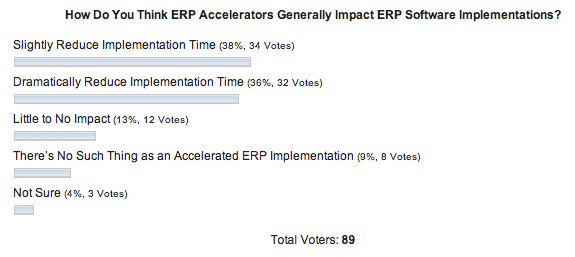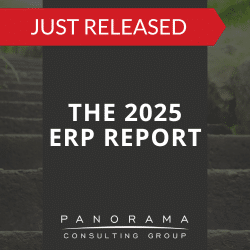ERP software providers love promoting software accelerators — especially to smaller, cash-strapped organizations — but are these pre-configured software versions all they are claimed to be? And if not, what are some other ways organizations can reduce ERP implementation durations?
Before your organization decides on any acceleration techniques, you should first base your time expectations on the achievements of similar organizations. With software accelerators, you might achieve something slightly shorter than the benchmark you determine – but not by much. A poll conducted by Panorama back in 2010 (below), shows that only 36-percent of organizations reported a dramatically reduced implementation time from the use of software accelerators. Most implementation times were slightly reduced or saw little or no impact from their use.
Software accelerators provided by ERP vendors are specifically designed to help companies reduce the cost, complexity and time associated with implementations. Accelerators can provide shortcuts in the technical configuration process, and they also can streamline specific industry verticals related to a company’s competitive advantage. However, configuration only accounts for about 20-percent of a project’s duration. Following are some project components that accelerators, by themselves, will not directly affect:
- Decision-making and executive alignment
- Defining strategic, operational, organizational and business process decisions
- Testing workflows and training employees
- Getting the entire organization to adopt the new business processes
The above components typically have a significant impact on project duration so many organizations will choose to accelerate these processes and use shortcuts other than software accelerators. The key is to aim for efficiency but, at the same time, maintain low costs and high quality.
Since software accelerators are not designed for all the processes you will want to shorten, your organization may want to consider the following non-technical acceleration techniques:
- Work in conjunction with your ERP implementation partner to document your existing business processes and determine your “to be” processes
- Make decisions relatively quickly – within hours, not days or weeks
- Minimize customization in areas that do not provide competitive advantage
- Create predefined scope statements
- Perform solution-driven requirements gathering
- Hire the right ERP consultants to help you and your organization through the difficult process
The average ERP implementation for a mid-sized company is 14 months. Don’t expect software accelerators, or any other shortcuts, to reduce this duration by a significant amount. ERP projects still need strong commitment from upper management, and a great deal of time is required to address all the project details. However, at the front end of the project, preparations can be made that will reduce unnecessarily long durations without sacrificing quality. To learn about how Panorama can help your organization with pre-implementation planning, visit our ERP Implementation Planning Workshop page. Also, be sure to visit our ERP Implementation page.













